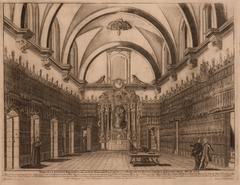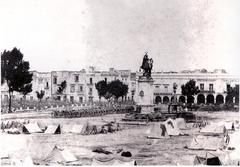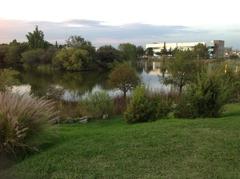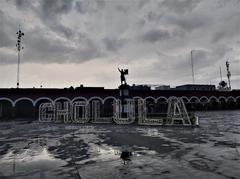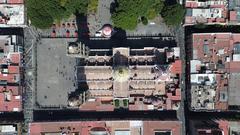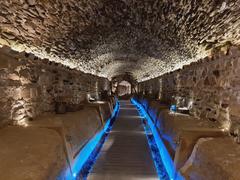Visiting Guide to Calle 44 Oriente in Puebla, Mexico
Publication Date: 18/07/2024
Introduction
Table of Contents
- Introduction
- Historical Background and Significance
- Visitor Information
- Nearby Attractions
- Special Events and Guided Tours
- Photographic Spots
- FAQ Section
- Conclusion
Historical Background and Significance
Pre-Hispanic Legacy
Long before the Spanish conquistadors set foot in Mexico, the area now known as Puebla was inhabited by indigenous groups, primarily the Chichimecas and the Tlaxcalans. While there’s no direct evidence of settlements on Calle 44 Oriente itself from this period, their presence is deeply embedded in the city’s DNA. The very grid-like layout of Puebla’s historical center, a characteristic shared by Calle 44 Oriente, is a testament to the sophisticated urban planning of these pre-Hispanic civilizations.
Birth of a Colonial Artery
The arrival of the Spanish in the 16th century marked a turning point in Puebla’s history. Founded in 1531, the city was strategically positioned as a vital link between the port of Veracruz and the burgeoning capital, Mexico City. Calle 44 Oriente, then known by a different name, emerged as a crucial artery within this network. Its proximity to the bustling main square, the Zócalo, solidified its importance as a center for commerce and social life.
A Street of Many Names
Over the centuries, Calle 44 Oriente has borne witness to the ebb and flow of history, reflected in the evolution of its name. While specific details about its early designations remain shrouded in the past, each name likely mirrored the prevailing social, political, or religious climate of its time. This constant renaming speaks volumes about the street’s dynamic role in the city’s narrative.
Architectural Echoes of the Past
Walking down Calle 44 Oriente today is akin to stepping back in time. The street is flanked by architectural gems that whisper tales of bygone eras. Many of these structures date back to the 17th and 18th centuries, showcasing a blend of architectural styles, including:
- Baroque: Characterized by its ornate decorations, dramatic curves, and sense of grandeur, the Baroque style is evident in several buildings along Calle 44 Oriente. These structures often feature intricate carvings, religious motifs, and vibrant colors, reflecting the opulence of the colonial period.
- Neoclassical: As the Enlightenment swept through Europe, its influence reached the shores of Mexico, ushering in the Neoclassical era. Buildings from this period, with their emphasis on symmetry, simplicity, and classical elements, offer a stark contrast to their Baroque counterparts. Calle 44 Oriente boasts a few examples of this architectural shift, showcasing the evolving tastes of Puebla’s elite.
From Colonial Grandeur to Modern Vibrancy
The 19th century witnessed Mexico’s tumultuous struggle for independence from Spain. While Puebla played a pivotal role in this fight, Calle 44 Oriente itself was spared from major upheaval. The street continued to thrive as a commercial hub, adapting to the changing times.
The 20th century brought about significant modernization, yet Calle 44 Oriente retained its historical charm. Today, the street seamlessly blends the old with the new. Traditional colonial buildings now house trendy boutiques, art galleries, and restaurants, attracting both locals and tourists alike.
A Living Testament to Puebla’s Rich Heritage
Calle 44 Oriente stands as a living testament to Puebla’s rich and layered history. It’s a place where the echoes of indigenous footsteps mingle with the grandeur of the colonial past, all while embracing the vibrancy of modern Mexican life. A stroll down this historic street is not just a walk; it’s a journey through time, offering a glimpse into the soul of Puebla.
Visitor Information
Visiting Hours and Ticket Prices
Calle 44 Oriente is a public street and can be visited at any time. However, the best time to experience its historical charm is during daylight hours when the buildings and shops are open. There are no entrance fees required to walk along the street itself, but some attractions and museums nearby may have their own admission fees.
Travel Tips and Accessibility
- Getting There: Calle 44 Oriente is centrally located in Puebla’s historical center. It is easily accessible by foot from the Zócalo or by public transportation.
- Accessibility: The street is pedestrian-friendly, with most areas being wheelchair accessible. However, some older buildings may not have modern accessibility features.
- Safety: Calle 44 Oriente is generally safe, but as with any tourist area, it’s advisable to stay aware of your surroundings and keep an eye on personal belongings.
Nearby Attractions
- Zócalo: The main square of Puebla, bustling with activity and surrounded by historic buildings and cafes.
- Puebla Cathedral: An iconic example of colonial architecture located just a short walk from Calle 44 Oriente.
- Museo Amparo: A museum offering an extensive collection of pre-Hispanic, colonial, and contemporary art.
Special Events and Guided Tours
Special events such as cultural festivals, street performances, and guided tours are often held along Calle 44 Oriente. These events offer unique insights into the local culture and history. Check local listings or visit the official Puebla tourism website for up-to-date information.
Photographic Spots
Calle 44 Oriente is a photographer’s dream, with numerous picturesque spots. Some must-see photographic spots include:
- The ornate Baroque facades of colonial buildings.
- The vibrant street art and murals that add a modern twist to historical surroundings.
- The stunning views of Puebla Cathedral and the Zócalo from certain vantage points along the street.
FAQ Section
What are the visiting hours for Calle 44 Oriente?
Calle 44 Oriente can be visited at any time, but it is best experienced during daylight hours.
Is there an entrance fee for Calle 44 Oriente?
No, there is no entrance fee to walk along Calle 44 Oriente.
What are the must-see spots on Calle 44 Oriente?
Some must-see spots include the Baroque and Neoclassical buildings, vibrant street art, and views of Puebla Cathedral.
Conclusion
Calle 44 Oriente offers a unique blend of historical richness and modern vibrancy. Whether you’re a history buff, architecture enthusiast, or simply looking to soak in the local culture, this street has something for everyone. Plan your visit today and step back in time while enjoying all that contemporary Puebla has to offer.
Call to Action
Stay up to date on the latest events and attractions on Calle 44 Oriente by downloading the Audiala mobile app, checking out other related posts, or following us on social media for more updates.


